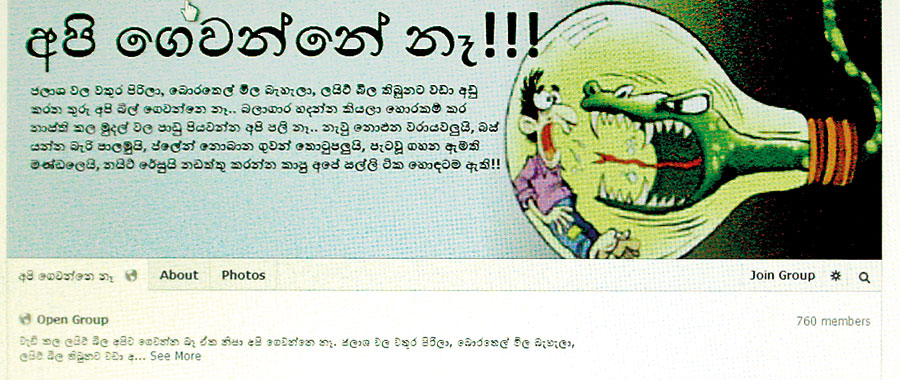News
A power unto itself CEB strictured by PUCSL
View(s):Electricity generation an absolute monopoly operating sans efficiency, transparency and reason
Sri Lanka’s electricity regulator has ordered the Ceylon Electricity Board (CEB) to check the efficiency of all thermal power plants, private and government-owned, before it asks for any more tariff increases.
The Public Utilities Commission of Sri Lanka (PUCSL) has also instructed the CEB to make its cash flows known; to install computer software that will optimize the manner in which it buys power from generation companies; and to submit long and medium term plans for how the CEB would secure fuel, including coal, for future power generation.

By last morning a Facebook page, ‘Api gewanney nehe’ had 800 members who vowed not to pay their electricity bills
The PUCSL attached eight conditions to the approval it granted the CEB for tariff increases. The revised electricity prices came into effect yesterday. The CEB has a monopoly over generation, transmission and distribution of power. Power sector sources said that an analysis of the conditions proves the CEB was neither transparent nor efficient—and that ordinary consumers were forced to pay.
Opposition lawmakers and trade unionists are urging the public to rebel against the steep increase in electricity prices which came into effect yesterday. Public anger has spawned a Facebook page called ‘Api Gewanney Nehe’. By yesterday morning, it already had 800 members who vowed not to pay their electricity bills.
“The reservoirs are full, crude oil prices have dropped, we will not pay our bills until the electricity prices are reduced,” the group’s tagline says. “We are not responsible for covering up losses incurred when money was stolen and wasted on the pretext of building power plants. It is quite enough that our money is being guzzled up in the maintenance of ports that ships don’t visit, bridges that buses can’t travel on, airports that planes don’t land on, a Cabinet of ministers that keeps multiplying and night races.”
The worst aspect of the tariff increase is that it will hit the low and middle income families the hardest, said UNP Parliamentarian Dr. Harsha de Silva. It will also result in across-the-board price hikes, he warned, particularly in essential goods and services. Dr. de Silva stressed that CEB losses must be curtailed as a matter of urgency. He said the cost of generation and distribution could be reduced by introducing accurate systems and methodologies rather than implementing new tariffs to cover up appalling losses.
Authoritative power sector sources said the PUCSL’s conditions are aimed at addressing all of these failings. For instance, the regulator has insisted on the CEB installing ‘dispatch planning software’ to ensure that electricity is procured from the many generation plants in the best possible manner.
“It is humanly impossible to do this manually,” said a senior engineer who did not wish to be quoted. “The CEB has a methodology for selecting how much power is purchased from each plant but nobody knows what it is.”
“There has never been an audit of power purchases,” this engineer elaborated. “The CEB buys about Rs. 190 billion rupees worth of energy a year and it is not audited. Nobody knows whether it can be done with Rs. 150 billion.”
The PUCSL told the CEB in November that it will not permit a tariff increase this year if the software was not installed. “It was dragging on for four years,” the engineer said. The CEB hurriedly purchased the software in January and the regulator has given an October 31 deadline for implementation.
The regulator has instructed the CEB to release its ‘Bulk Supply Transaction Account’ which reveals how much money the utility pays for electricity—and how much is earned through distribution of the power bought in this manner. “These sums must be accounted on a daily basis,” a senior official said. “It is only then that we can see the real cash position of the CEB.”
Follow @timesonlinelk
comments powered by Disqus



















